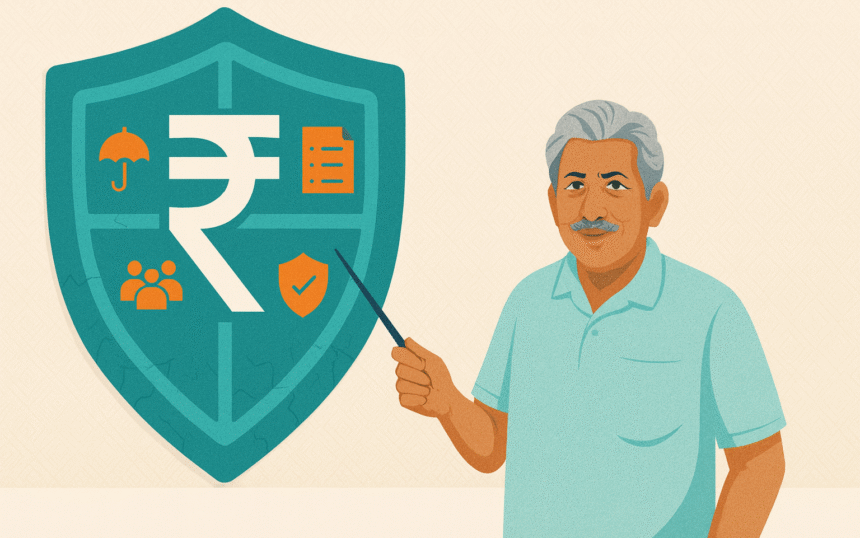
Rakesh from Maninagar felt proud. Thirty four, new baby, tight budget, and a term plan for less than a weekend dinner. Sasta, smart, done.
Two years later Meera, his wife, sat with me, files in hand. The claim was stuck. A small health detail he had skipped to keep the premium low was now a big wall. One of the common term insurance mistakes is chasing the cheapest premium and ignoring what it hides.
I have seen this pattern across Ahmedabad and Surat. Low premiums come from trade offs. Fewer questions at buying time. More questions at claim time. Narrow riders. Tough exclusions. Weak service when the family needs help. The money saved each month becomes stress later.
Term insurance is a seatbelt for your family, not a discount coupon. The right belt is the one that holds in a crash. That means honest forms, clear riders, and an insurer known for settling claims on time. Price matters, value matters more.
If your policy choice rests only on the lowest quote, pause. Check what is covered, what is not, and how claims are actually handled. Ask for medicals. Disclose everything. Spend a little more now so your family spends less worry later.
Ready to keep the purpose of term insurance crystal clear, and then choose wisely?
Term insurance is protection, not returns, keep the purpose clear
At the chai tapri near Law Garden, a young father told me he would buy a term plan that gives money back at maturity. I smiled. Beta, if it gives money back for sure, it is not a pure term plan.
A term plan is a safety net. If you are not around, it replaces your income for your family. If you live a long life, nothing pays out. That is the design. You paid for peace, like a good helmet. No one asks a helmet for cashback.
When we mix insurance and investment, both parts get weaker. A ULIP or endowment tries to be two things. The cost is higher, the cover is lower, and the growth is often modest. For protection, keep it simple with term insurance. For growth, use your PF, PPF, or mutual funds. Alag alag rakhoge, you will think clearly.
How do you judge value then, if not by maturity value? Look at how much life cover you get for every rupee of premium. Check the claim record and service quality. Confirm exclusions. A plan that quietly pays a clean claim is more valuable than one that promises returns with fine print.
A quick picture helps. You earn, say, 12 lakh a year. Your family depends on that income for many years. The right policy replaces that stream if life turns harsh. That is all. Simple, strong, focused.
Next, let us decide how much cover truly fits your family, not just a thumb rule.
How much term plan cover you actually need
Bhavna in Surat used 10 times salary. It looked neat on paper. Then we listed her home loan and the years left for her child’s education. The gap showed up in minutes.
Thumb rules are a starting point, not a safety plan. Real life needs your numbers, not averages. We build the cover from your monthly reality.
Start with income your family uses today. Remove expenses that would stop, like office commute. Add the loans that must be closed. Add the goals you want to protect, like college or parents’ care. Now ask, for how many years should this income be replaced.
A simple way to see it, cover equals yearly family need multiplied by years, plus all loans and must-do goals, minus money already saved. If you are early in career, add a cushion for price rise each year. If that math feels heavy, sit with me once, we will do it slowly.
Three numbers to write down, keep this card in your wallet.
- Yearly family need after today’s adjustments.
- Total loans and must-do goals.
- Years until the youngest dependent stands on their feet.
Next, let us pick a policy tenure that stays with you till responsibilities end, not till the lowest premium appears.
Tenure that lasts through your responsibilities, not the shortest term
When Kiran from Rajkot bought his plan, he picked 15 years. The premium looked light. He was 32 then, with a 20 year home loan and a two year old. At 47 his cover ended, but his EMI and family needs did not. That gap kept him awake.
Shorter terms feel smart because the price drops. The risk shifts to your older self. Renewing later costs much more. Health checks get tougher. Some conditions turn uninsurable. A long term avoids that stress.
Think in milestones, not months. Till your youngest child finishes studies. Till your spouse’s retirement. Till the last loan is closed. If your family depends on your income to age 65, pick a term that reaches there. Add a small cushion. Life does not follow neat dates.
Buying early helps. A 30 year old locking 30 or 35 years gets strong cover at a steady premium. The same person at 45 faces higher rates for a shorter runway. Do not chase a term that ends just before your big responsibilities do. That is like leaving the match at 90 minutes and missing stoppage time.
You may see options for cover till 80 or 85. Choose them only if someone will still depend on your income then. Extra years you do not need are paid years.
If you already hold a short term, do not panic. We can review your remaining years, your loans, and your goals. We can layer a second policy to bridge the gap.
Ready to check your calendar of responsibilities and match a term that actually lasts?
Price versus value, claim settlement track record, service and exclusionsNilesh from Vadodara compared two quotes. One was cheaper by a cup of chai a day. He picked it, felt clever, and filed the papers. Three years later, his family found out what that saving really bought. Delays, extra questions, and a clause they had never noticed.Price is visible. Value shows up only at claim time. A good term plan feels boring while you pay, and dependable when life hits hard. That dependability comes from three things, how fairly the insurer settles claims, how they treat families during a claim, and what the policy quietly excludes.Look at the claim story first. Check how often the insurer approves claims and how quickly they pay. Read one or two real claim experiences online, not only brochures. If an insurer asks for proper medicals at the start, take it as a good sign. They are doing the hard work early so your family has an easier time later.Service matters more than we think. Does the company offer a clear claim checklist. Is there a helpline that actually answers. Is there a local office or a responsive digital desk. When a family is grieving, simple steps, clear forms, and a steady voice are worth more than any ad promise.Exclusions are the fine doors that close. Death during unlawful activity is not covered. Suicide is excluded in the first year in many policies. Non disclosure can void a claim even after years. Read the clause headings once with a calm mind. If something is unclear, ask. It is better to feel slow today than stuck tomorrow.
Riders that truly matter for Indian families, critical illness and accident
Mansi’s father in Vadodara had a mild heart attack. He recovered, but the bills and weeks of no income hurt. Their term plan had a critical illness rider. A one time payout came within days. The family stayed steady.
Riders are small add ons that cover specific risks. They sit on top of your term plan. The good ones protect against events that strain cash flow, not just life itself.
Start with critical illness. It pays a fixed amount on the first diagnosis of a listed illness. That money fills the gap between hospital bills and daily costs. Check the list of illnesses, the waiting period, and the survival period. Pick a sum that can carry three to six months of expenses.
Add accidental death benefit only if you often travel by road or work around risk. It increases the payout if death is due to an accident. Do not confuse it with a separate personal accident policy, which covers disability too. If your life involves highways, consider both.
Waiver of premium is quiet, but powerful. If a covered disability or illness hits, future premiums stop, and the cover continues. In long terms, this one feature keeps the plan alive when earning becomes hard.
Skip fancy riders that sound clever but rarely pay. Keep the rider pack light and useful. Read how and when the payout triggers. Ask how claims are processed for riders. The same claim team should handle it smoothly.
If you want a quick rider check on your current plan, talk to Sharmaji.
Payout options and nominee readiness, a simple setup for peace of mind
Saira in Navrangpura kept every bill in a neat file. When her husband passed, the insurer asked a simple question. Lump sum or monthly income. She chose monthly. School fees and rent stayed steady. Grief did not turn into panic.
You can choose how the claim pays. A full lump sum works if your spouse is confident with money. A fixed monthly income feels like a salary replacement. Many plans let you split it, some money now, the rest every month. Think of your home’s rhythm, EMIs, school fees, parents’ medicines, and pick what fits.
Set the nominee with care. If the nominee is a minor, name an appointee you trust. Update the name after marriage, a child’s birth, or a move. Keep bank details current. Tell your family which account will receive the money. The claim team needs clarity, not a treasure hunt.
Create a small claim folder today. Policy bond, proposal copy, payment receipts, KYC, and a cancelled cheque. Save the soft copies in email. Add the insurer’s claim email and phone number to your contacts. Tell your spouse where this sits. One calm evening now saves ten hard calls later.
Some policies allow the nominee to change the payout option at claim time. Check this while buying. Flexibility helps when life moves in ways we cannot plan.
Bringing it all together
Before we close, take a breath.
You now know the traps, from cheap-but-costly premiums to short terms, from skipped disclosures to rider confusion. None of this is theory. I see these mistakes in real files, with real families across Gujarat. A little care today brings steady sleep tomorrow.
If you want a calm, 1 to 1 review of your numbers and a clean short list, talk to Sharmaji today.


